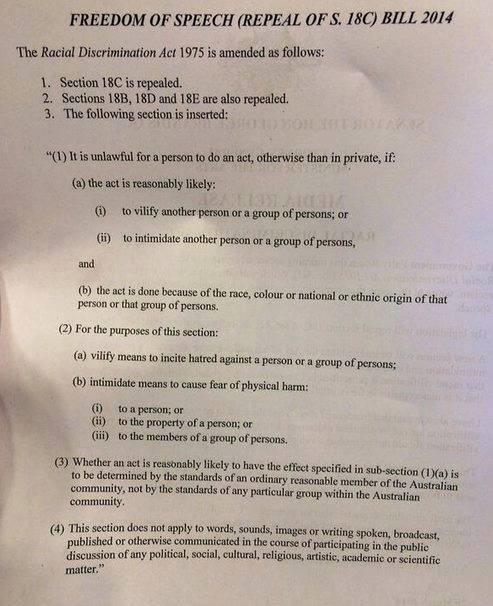UPDATES
Exposure draft of the Freedom of Speech (Repeal of S. 18C) Bill 2014: Initial Analysis
March 25, 2014 | Daniel Meyerowitz-Katz

Daniel Meyerowitz-Katz
Federal Attorney-General George Brandis has released an exposure draft of his proposed changes to section 18C of the Racial Discrimination Act, which currently forbids doing an act done because of someone’s ethnicity which is reasonably likely to ‘offend, insult, humiliate or intimidate’ that person, as well as section 18D, which provides public interest exemptions to 18C. The government has opened the draft to community consultation and called for submissions. Here is AIJAC’s initial analysis of the legal implications of the exposure draft.
Subsection (1) of the draft provision makes unlawful an act done otherwise than in private which ‘vilifies’ or ‘intimidates’ a person or group of persons when that act is done because of the race, colour or national or ethnic origin of that person or group. On the face of it this looks essentially the same as 18C, except with the words ‘offend’, ‘insult’ and ‘humiliate’ replaced with ‘vilify’. However the meaning has been substantially narrowed by subsection (2).
In subsection (2), ‘vilify’ is defined as ‘to incite hatred against a person or a group of persons’ and ‘intimidate’ is defined as ‘to cause fear of physical harm‘ to a person, their property, or members of a group of persons (emphasis added).
Limiting ‘vilify’ to incitement of hatred substantially narrows the proposed provision beyond the existing racial vilification laws in NSW, Victoria, South Australia, Queensland, Tasmania, and the ACT, which forbid inciting ‘hatred towards, serious contempt for, or severe ridicule of’ a person or group.
Limiting intimidation to fear of physical harm to person or property would exclude cases where persons were fearful for their dignity or quality of life, but not necessarily of violence. For example, it would make legal the incident in Kanapathy v In De Braekt, in which a Singaporean security guard at a court was viciously abused by a lawyer after trying to conduct a routine security check on her. It is unlikely that he would have felt fearful of physical harm and she most likely did not incite hatred towards him, but the incident was sufficiently serious to have her stricken from the roll of legal practitioners for bringing the profession into disrepute, and to cause him to suffer significant psychological harm.
Subsection (3) codifies the ‘community standards’ test, which has been accepted jurisprudence in 18C cases. The wording is a little unusual in that it specifically refers to ‘the standards of an ordinary reasonable member of the Australian community’ as opposed to ‘the standards of any particular group within the Australian community’. This suggests that there is a class of ‘ordinary’ Australians who are not members of ‘any particular group’ and, by implication, that members of particular groups might not be ‘ordinary’ Australians.
Finally, subsection (4) appears to replace the current section 18D. The subsection exempts any communication ‘in the course of participating in the public discussion of any political, social, cultural, religious, artistic, academic, or scientific matter.’
Unlike 18D or defamation defences such as ‘fair comment’, the proposed provision does not require any degree of factual accuracy or reasonableness in order for an act to be exempt. Consequently, any communication at all which purports to be a part of a public discussion on essentially any issue would be exempt. In virtually all previous decisions under 18C, the respondent could have claimed to have been engaging in public discussion on one of the included categories.
For example, in Clarke v Nationwide News, commenters on the perthnow.com.au website could claim they were making comments in the course of public discussion over whether the people of Perth were ‘fed up of’ the crime, drunkenness and bad behaviour of Aboriginal Australians, and whether or not Aboriginal Australians could behave themselves at their children’s funerals. This is of no real value to public life in Australia, but is nevertheless a public discussion of social issues.
Tags: Australasia





